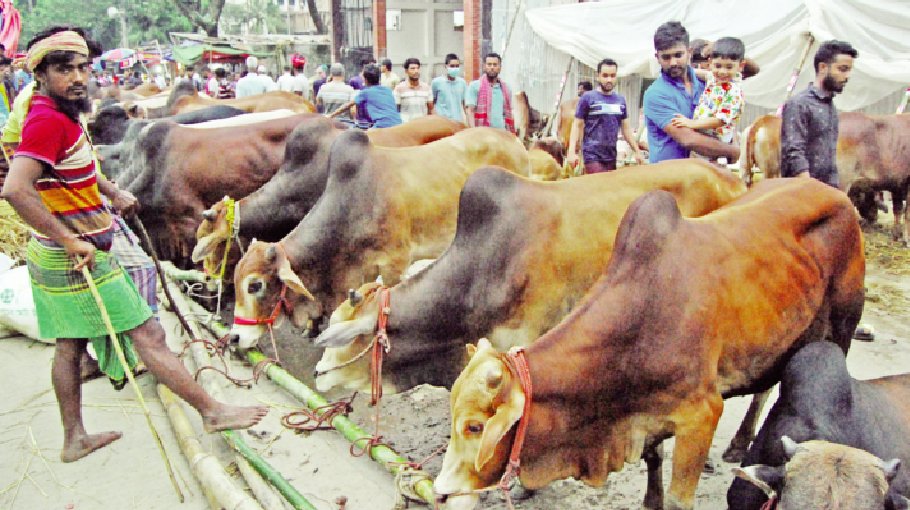Too many head of cattle, too few buyers
Market mismanagement alleged

With only two days Left for Eid-ul-Azha, cattle markets are going Momentum across Dhaka, including Gabtoli, as buyers and traders gather for the annual ritual of Qurbani. Yet despite the influx of sacrificial animals, sales remain sluggish.
Traders at the capital’s largest cattle markets report that while supply is abundant and prices are comparatively low than that in previous years, buyer’ interest is yet to gain momentum.
On a visit to the Gabtoli market on Wednesday, truckloads of cattle continued arriving from various districts. Among them was Mohammad Shahinur Rahman, a farmer from Golapnagar in Bheramara, Kushtia, who brought 15 cows to market on Monday. Three days later, he is yet to sell a single one.
“Prices are low, but buyers are scarce. Nobody is even quoting a big price,” Shahinur said, visibly disheartened.
Tutul Hossain, a trader from Gangni in Meherpur, echoed similar frustration. Having purchased cows at Tk 35,000 per maund from a local market—and incurring an additional Tk 5,500 per cow in transport and logistics—he now finds customers unwilling to meet his asking prices.
“I’m quoting Tk 275,000 for a six-maund cow, but buyers are offering just Tk 25,000 per maund. That’s a clear loss,” he said.
Hashmat Ali from Jibannagar, Chuadanga, added that buyers are offering no more than Tk 210,000 for cattle that cost him Tk 300,000. “If I can't sell these animals, I’ll be in serious trouble,” he warned.
Meanwhile, buyers are also voicing dissatisfaction, complaining that prices remain beyond their reach. Shikdar Mehedi, a resident of Agargaon, said, “Traders are quoting inflated prices. Hopefully, costs will drop from Thursday onwards.”
Traditionally, cattle sales peak two to three days before Eid, as many urban dwellers opt for last-minute purchases due to limited space at Their Houses. Those with private residences, however, tend to buy earlier.
Alongside road transport, cattle are also arriving at Gabtoli via waterways from districts like Manikganj and Munshiganj. Market officials expect a sharp increase in buyer turnout between Wednesday night and Friday afternoon, potentially boosting sales activity.
Elsewhere in the city—at Diyabari, Khilkhet Mastul, and the Tejgaon Polytechnic ground—trading has already begun. However, persistent rain has turned these markets into muddy, waterlogged spaces, causing severe discomfort for farmers, sellers, and buyers alike.
At Diyabari, Pabna-based farmer Ahsan Habib Topu described the situation: “The market is flooded, with no effective drainage. Sand trucks are coming, but not enough. Even food from local eateries is overpriced.”
He added that traders have to buy sand at Tk 2,400–2,500 per truck, driving up overall costs. Despite the market committee’s promise to provide sand free of charge, the promise remains unfulfilled.
At Khilkhet Mastul, farmer Khokon brought 30 cows from Jamalpur, but could Sell only six so far—and at unsatisfactory prices. “The management is poor, and the committee isn’t performing its duties. Lack of facilities is turning away buyers,” he said.
Residents near the Tejgaon Polytechnic ground have complained about loudspeaker announcements disturbing the neighbourhood and nearby hospital patients.
Locals also accused the leaseholder, Zayan Enterprise, of violating rules by operating beyond designated boundaries, including the Metropolitan Bridge area.
Abdul Malek, a trader from Sirajganj, highlighted further shortcomings: “There are just two water taps for the entire market, causing long queues. Veterinary services are also lacking.”
He raised security concerns as well, noting, “The presence of hawkers is excessive, and there’s fear of theft by organised groups.”
Despite the challenges, some eye-catching entries have stirred excitement. Shahjalal Sujon, owner of Swad Cattle Farm in Cumilla, has brought several distinctive animals to market—most notably a 1,200-kg bull named ‘Hamza’ that has captivated visitors and buyers alike. Another prized bull, ‘Rustam,’ is priced at Tk 18–19 lakh.
Sujon said he brought 30 animals this year and has already sold eight. “The enthusiasm from buyers has made me hopeful about selling the rest,” he shared.
Dr Md Sabbir Rahman, serving as a veterinary consultant for the leaseholder, said he has examined approximately 100 cattle so far, with no signs of chemical fattening or drug use observed.
Market management representative Maksudur Rahman Didar reported that 150 staff members are working to ensure smooth operations. “We’ve set up 20 collection booths and 10 entry gates, and law enforcement is present round-the-clock to maintain order,” he said.
However, local residents allege that the leaseholder is using public roads to construct permanent structures, currently operating as bank booths but suspected to become private offices later.
Sub-Inspector Abu Isa of Tejgaon Industrial Police Station, responsible for security at the Tejgaon market, said he has been on duty since May 28.
He confirmed that multiple security agencies—including DGFI, NSI, and SB—are deployed, along with a 40-member Public Order Management force working in two shifts since Monday.



